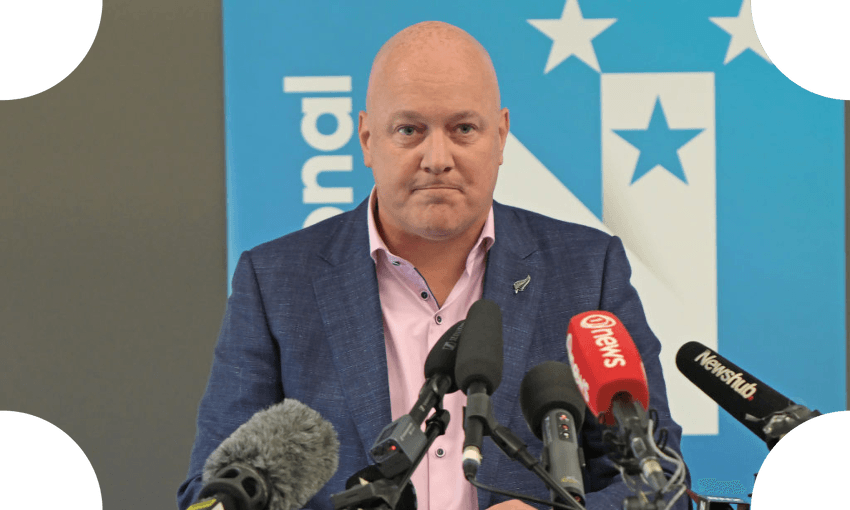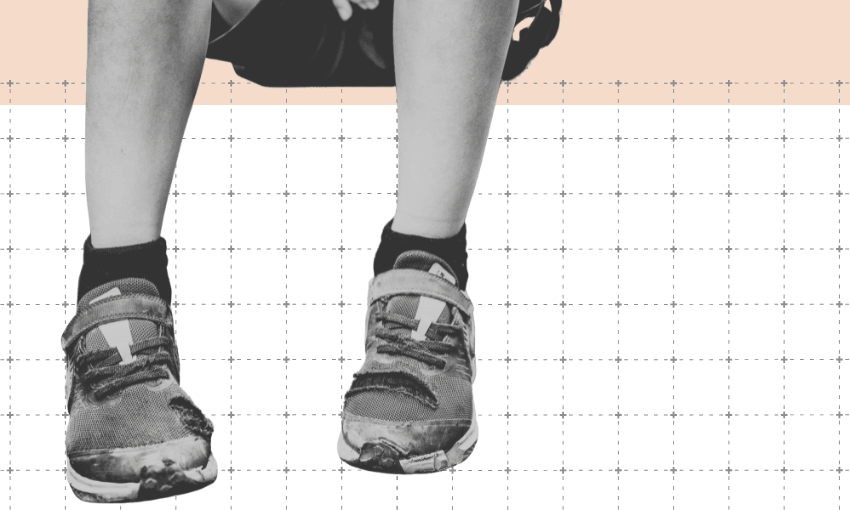Christopher Luxon looked full of confidence, but faces criticism for comparing crime in New Zealand with ‘the southside of Chicago’.
For today at least, Napier is part of Caucus Bay. Confirming that the political gods are in mischievous mood for election year, both of the big political parties are holding their summer retreats in the city, bringing more MPs to a location outside Wellington at once for the first time since, I don’t know, maybe ever?
Apart from the team-building, strategy plotting and wine-tasting, each party leader uses the caucus retreat for the first media set-piece, hoping to create a positive early impression with the public. That’s true every January; triple it in election year.
On that score, Christopher Luxon was a picture of confidence this morning. In a speech to MPs, supporters and media he sought to project optimism while scowling gravely at the state of the economy, squaring that circle by telling everyone, time after time, how New Zealand is the best country on the planet – trouble is, it’s “heading in the wrong direction”. That’s an assertion supported by polling – just. In the last survey by Talbot Mills, completed in November, the number of people who thought the country was on the “wrong track” rose from 46% to 49%, with those picking “right track” dropping by about the same margin to 41%.
Luxon attempted to channel the dissatisfaction less in a tone of anger than disappointment – condescension even. As if to say, this Labour group tried their hardest, poor lambs, but have proved victims of their own ineptitude and ideological blinkers.
The remainder of Luxon’s speech majored on the economy, and a pledge to be “single-mindedly focused on a clear set of priorities”. He specified four: reducing the cost of living and an “inflation fighting plan”; a “five point plan” for prosperity and growth; a law and order plan to stop New Zealand becoming “southside Chicago” (on which more later); and, finally, a focus on education and health frontline services, with a focus on outcomes.
Luxon’s speech followed the announcement earlier in the day of what he called a “limited reshuffle”, and so it was. It was a good reshuffle for people who were leader of the National Party in July 2020, with Judith Collins rewarded for assiduous work in her science and technology portfolio – by gaining more responsibilities and leaping up the ranks from 18th to 10th.
Todd Muller, meanwhile, adds climate change to agriculture and moves up to 12th. Muller has previously worked constructively on climate change policy with James Shaw – the twinning of agriculture and climate change will make him an important figure in the passage and ongoing viability of the He Waka Eke Noa scheme to bring farming into the emissions scheme.
Another change of note is the return of an “Auckland” portfolio, with Simeon Brown adding responsibility for Super City issues to his existing transport role. Labour has previously had an Auckland issues minister (Judith Tizard) and, in opposition, spokespeople; there is an argument for the government, too, to formally give someone responsibility for the city.
The elephant in the reshuffle announcement was Barbara Kuriger, who lost the agriculture portfolio after it emerged she had used her parliamentary letterhead to lobby and upbraid officials in the interests of her son, who faces animal mistreatment charges. Kuriger says she won’t be quitting parliament. Luxon says he won’t rule out a return to a senior role for the Taranaki King Country MP if she can “demonstrate she has the judgment”.
Reality landed for Luxon in the press stand-up, where he faced questions straight off the bat about drawing comparisons between crime in New Zealand and the “southside of Chicago”, where violent crime including homicide is rampant. That line followed assurances earlier in the day that National would pursue a clean campaign. Luxon dismissed suggestions such rhetorical devices amounted to “fear-mongering” or “Trump-like” tactics. If the Chicago line ends up high in the TV news, however, plenty of National supporters would be delighted.
He was further grilled on the Kuriger situation, his willingness to work with New Zealand First and the lack of policy (on the latter two, the answer is: tell you later). He faced questions, too, on a broiling controversy around the candidate selection in the Hawke’s Bay electorate Tukituki. That Cameron “Whaleoil” Slater and Simon Lusk, stars of National Party Punch and Judy psychodramas of the past, are involved is a mixed blessing for Luxon and the new party president, Sylvia Wood. Yes, it is an unwelcome resurfacing of Dirty Politics storylines; on the other hand, it is easier to dismiss as histrionics from old ghosts who no longer hold any sway as far as the National leadership is concerned. “That era of dirty politics is well behind the National Party,” said Luxon today.
As far as the rest of the year is concerned, meanwhile, the mantra is clear enough. In 2017, under new leader Jacinda Ardern, the slogan was Let’s Do This. What is the National Party 2023 version of that? Imagine Let’s Do This but spoken with a grudging realist tone, as if staring at a house that needed rapid repainting after a botched job and you get the mantra, delivered at least half a dozen times in Luxon’s speech and the introduction from his deputy, Nicola Willis: Let’s Get This Done.
Follow our politics podcast Gone By Lunchtime on Apple Podcasts, Spotify or your favourite podcast provider.





